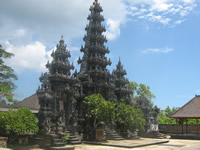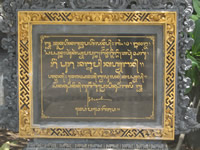 Riding up the hill from Bualu close to Nusa Dua, one comes across a local market type scene. When I passed by there was a large number of Muslim people milling around, visible by the prayer mats over their shoulder, or pecis, the black hat Javanese men wear. The many Javanese people employed in the area, in construction and other activities, means there are small centers of Javanese people, this being one. In this immediate area there is a Balinese temple, a mosque, 2 churches and a Buddhist temple. About 200 meters after this market scene, the scenery turns again to untouched fields of small trees. Then comes another surprise, in the form of an elegant temple. Parking my bike under a shady tree, I dismounted and went over to check the place out.
Riding up the hill from Bualu close to Nusa Dua, one comes across a local market type scene. When I passed by there was a large number of Muslim people milling around, visible by the prayer mats over their shoulder, or pecis, the black hat Javanese men wear. The many Javanese people employed in the area, in construction and other activities, means there are small centers of Javanese people, this being one. In this immediate area there is a Balinese temple, a mosque, 2 churches and a Buddhist temple. About 200 meters after this market scene, the scenery turns again to untouched fields of small trees. Then comes another surprise, in the form of an elegant temple. Parking my bike under a shady tree, I dismounted and went over to check the place out.
The look of the temple suggested it was new, with clean, elaborately decorated cement walls. There was also an elegant notice in Balinese script naming the temple. While I was there, a Balinese man came bearing offerings, he told me the temple was the Pura Dalem Bualu. The pura dalem is the temple of the dead, where cremation ceremonies take place.
 When a Balinese person dies, a ceremony is performed and the body is buried. At a later date, sometimes years later, when preparations are complete and money raised, the body is recovered and prepped for the cremation. Visitors to Bali may have seen processions passing in the street, with a tall multi-roofed tower. This cremation tower represents the universe and the body is carried inside. Once the procession reaches the pura dalem, the body is transferred to an effigy of a bull, which is then set ablaze. There is of course a lot more to it, but that’s the framework of the event. Ashes of the deceased person are taken to be scattered in the ocean, which accounts for some of the beach-side ceremonies and the sight of a man supported by a couple of close friends, balling his eyes out after returning from the waters edge. Feel free to stop and observe a Balinese street procession, or a cremation ceremony at a temple. Of course be courteous and wear a sarong and sash before entering a temple.
When a Balinese person dies, a ceremony is performed and the body is buried. At a later date, sometimes years later, when preparations are complete and money raised, the body is recovered and prepped for the cremation. Visitors to Bali may have seen processions passing in the street, with a tall multi-roofed tower. This cremation tower represents the universe and the body is carried inside. Once the procession reaches the pura dalem, the body is transferred to an effigy of a bull, which is then set ablaze. There is of course a lot more to it, but that’s the framework of the event. Ashes of the deceased person are taken to be scattered in the ocean, which accounts for some of the beach-side ceremonies and the sight of a man supported by a couple of close friends, balling his eyes out after returning from the waters edge. Feel free to stop and observe a Balinese street procession, or a cremation ceremony at a temple. Of course be courteous and wear a sarong and sash before entering a temple.